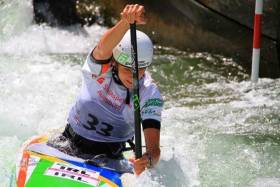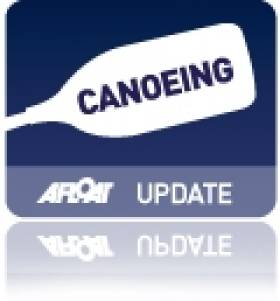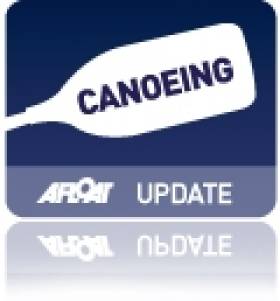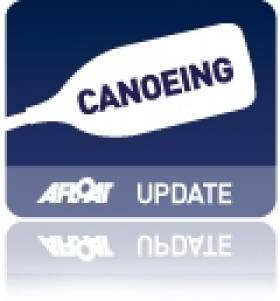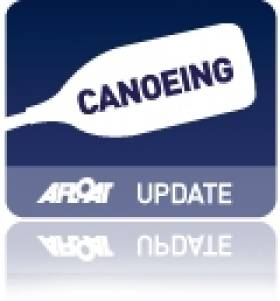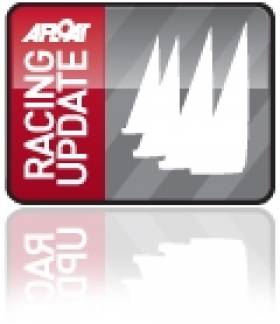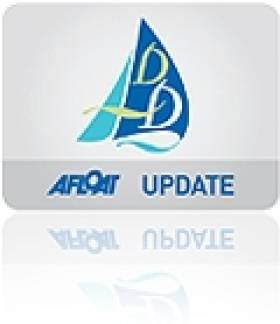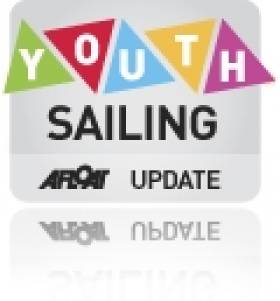Displaying items by tag: Craig
Liam Jegou Impresses at Irish Open in Lucan
#Canoeing: Liam Jegou (20) took until his second run to master a tough course at the canoe slaolm Irish Open at Lucan today. The C1 competitor lowered the time of his first run by over 10 seconds, setting a winning mark of 90.81 seconds. Mike Kurt, the Swiss international who set the pace in the K1, also struggled on his first run on a course where two upstream gates below the sluice tested all the competitors. Kurt nailed it on the second run, with the best penalty-free time of the day – 89.08 seconds. Ciarán Heurteau, recovering from injury and a break from the sport, was the best Ireland senior competitor, being credited with 95.01 seconds, which included four seconds in penalties. Sam Curtis was bang in form at under-23 level: his first run was a winning one of 90.56 seconds. He bettered the time in the second run (88.64) but was adjudged to have touched one gate and missed another, so incurring 52 points in penalties.
Hannah Craig was the top woman competitor in the senior K1, while Caoimhe O’Ferrall set an excellent time of 121.92 in the C1, though she is just 18.
Canoe Slalom Irish Open, Lucan, Sunday (Selected Results)
Men
K1 – Senior: 1 M Kurt 89.08, 2 C Heurteau 95.01, 3 P Hynes 110.55. Under-23: S Curtis 90.56. Under-18: L Palmer 105.42. Masters: A Boland 114.79. Vets: G Collins 135.86.
C1 – Under-23: 1 L Jegou 90.81, 2 R Hendrick 99.25, 3 J Cochrane 101.34. Under-18: E Moorhouse 124.24. Under-16: F McNally 121.7
Women
K1 - Senior: H Craig 109.13. Under-23: G Ridge 108.5. Under-18: M Hamer Evans 109.06. Under-16: K Davidson 128.4.
C1 - Under-23: C O’Ferrall 121.92.
Heurteau Sole Irish Qualifier at Augsburg World Cup
# CANOE SLALOM WORLD CUP: Ciaran Heurteau was Ireland’s sole qualifier for the semi-finals on the first day of the canoe slalom World Cup in Augsburg, Germany. Heurteau, who has an Irish mother but was brought up near Paris, secured his place with his first run, and finished 23rd of the 40 qualifiers on a difficult course. Eoin Rheinisch placed 49th, missing a semi-final for the second successive World Cup. He also missed out in Cardiff.
Liam Jegou, who is just 17, did well but was disappointed with placing 44th in the men’s C1. Hannah Craig fell ill and did not compete in the women’s K1.
Canoe Slalom World Cup, Augsburg, Germany, Day One (Irish interest)
Men
K1 – Heats (First 40 Qualify for Semi-Finals): 1 Slovenia (P Kauzer) 98.22 secs; 23 C Heurteau 104.42 (incl 2 sec pen; 1st run); 49 E Rheinisch 107.52 (2nd run); 61 P Hynes 114.76 (2nd Run);
C1 – Heats (First 20 Qualify): 44 L Jegou 118.32 (incl 4 sec pen; 2nd run).
Women
K1 – Heats: H Craig did not start.
Craig Comes Close in Canoe Slalom Championships
# EURO CANOE SLALOM: Hannah Craig finished 17th of the 40 competitors in the women’s K1 at the European Canoe Slalom Championships in Krakow in Poland today. The Ireland Olympian clocked 99.82 seconds in the heat, which put her just 1.01 seconds behind the 10th place finisher who secured a slot in the final. Aisling Conlan was given three 50-second penalties and finished 40th.
Canoe Slalom European Championships, Krakow, Poland, Day Two (Irish interest)
Women – K1 Heat (First 10 to Final): 1 Britain (F Pennie) 92.01; 17 H Craig 99.82; 40 A Conlan 274.24 (122.24 plus 152 sec penalties).
Bratislava Blues for Ireland's Women Paddlers
Neither of Ireland’s women’s K1 paddlers made it through to the semi-final of the Canoe Slalom World Championships in Bratislava today.
Aisling Conlon finished 61st and Hannah Craig – who was given a 50-second penalty for missing gate nine on both of her runs - ended in 66th. Only the top 30 progress. Ireland can not now qualify a boat in women’s events for the Olympics at this championships.
Women
K1 – Heats (top 30 to Semi-Final): 1 Spain (M Chourraut) 96.14 seconds; 61 A Conlon 120.39 (24.25 behind); 66 H Craig 158.15 (62.01 behind)
Conlon and Craig Must Do It Again at Slalom World Championships
Nick Craig Reflects on Fourth OK Dinghy World Title
Nick Craig chats to Robert Deaves after his record-equalling fourth OK Dinghy World title
How times have changed. A little over seven years ago, no British sailor had ever won the OK Dinghy World Championship. It was a commonly held belief in the class that no British sailor ever would. They were just not up to the job, or jinxed by 50 years of history. Jim Hunt changed all that in 2004 with a decisive win on home ground at Parkstone on the UK's south coast.
Then it was Nick Craig's turn, winning the title in 2005, 2006 and 2007 to become only the third person to win three titles and only the second to win three in a row. This year in Largs, Scotland, Craig won it for a record equalling fourth time after one of the trickiest and closest world championships ever held.
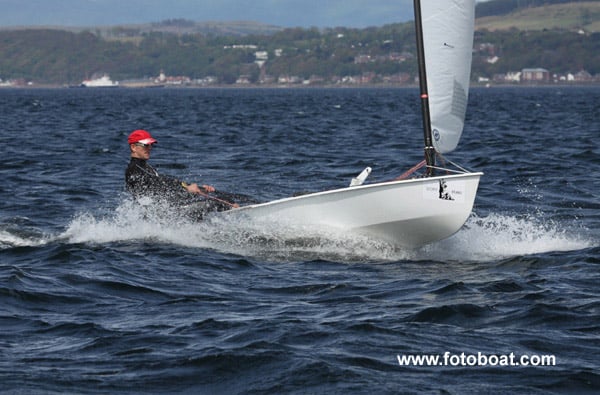
Craig joins Leith Armit (NZL), who won in 1983, 1985, 1990 and 1994, and Bo-Staffan Andersson (SWE) who won in 1988, 1991, 1992, 1993, as the only sailors to have won the title four times.
In addition, Craig rises to the top of the 'Best OK Dinghy sailors of all time' list, overtaking class legend Jørgen Lindhardtsen (DEN).
Several weeks after the win, Craig reflected on the regatta. It was not the easiest of weeks, plagued by light and unstable winds and unusually high temperatures. Only seven out of the ten scheduled races were held after several long days on the water with very little to show on the scoreboard.
Craig said, "However, it was a very well run event. On shore side, it was one of the best events I've done. The family and friends events were organised by Sue Byers. There were activities every day, which meant my wife and kids had a great time which is very important."
"It's just a shame the wind didn't play ball. The sailing was very challenging with light, unstable winds, but the race team made the best of it so we raced in the best conditions available."
What were his expectations going into it the regatta and how did that change during the week? "I was aiming to win but stayed pretty philosophical with the difficult conditions. I was sailing my best and if the wind was a bit random there wasn't a lot I could do about it. I didn't open the week well with a 16th and then an 11th in race three but I knew it would be high scoring so I just kept plugging away."
And the threats? "It was as expected – a great mix of experience in past World Champions Thomas Hansson-Mild (SWE) and Greg Wilcox (NZL) and new blood from Bartosz Rakocy (POL). In light winds I expected the German team to be fast which they were and in breeze the Aussies are fast."
After finding great speed in years past to win three world titles with his Celidh mast and North sail combination, Craig has struggled with speed issues in recent years, after the rest of the world caught up. And to some extent this still dogged him in Largs. "The biggest challenge was my lack of pace in the very light airs. I was just off the pace upwind in sub-hiking conditions, which made life very difficult on the big course. I was having to start very aggressively and get all the shifts right to get any decent results in these conditions."
The event had started on a low point for Craig. "My car, which was packed for the event and a two week family holiday, was stolen from the sailing club the weekend before the event and it made the week before very hectic with replacing the car, towbar, clothes, cot bed, credit cards and sailing kit as well as going to work. The biggest low point was how useless the police were – the thief phoned my wife on my phone so could easily have been caught."
And once into the racing, he didn't have the best start. "The opening race was pretty horrible for me. I got a great start but my pace was ordinary, I got on the wrong side of the last shift into the windward mark, and then got killed when the second reach turned into a run so I just scraped a 16th."
However the championship was still wide-open going into the seventh and final race, held right on the time limit. Craig, who was in fourth place overall, needed things to go his way. "The highlight of the event for me was the first beat of the last race. I got a bit lucky - there was a shift and new breeze on the left which I was in so I rounded the top mark first with none of my competition in the top 20."
"After that stroke of good fortune, it was still a tricky race. The wind stayed very light and I again struggled a bit for pace so slipped to fourth through the race whilst Greg Wilcox was coming through quickly. The run was painful as the leeward marks were moved to make it longer and the wind filled in from behind so at one point it looked like I'd be engulfed by the chasing pack. The fleet then inevitably split at the leeward gate but thankfully the wind filled in on my side so I clung on to take the title by just two points."
What does a fourth world title mean to him? "It means a lot – winning it this time round was in many ways a lot harder than any other time as I'm sailing less so it's harder to get an edge."
"The rigs have also moved on a lot over the last few years and I've been behind as I've been sailing other boats and doing less sailing. But I'm happy that I've now got a rig that works well across the wind range. I've got no edge though, so I'll be trying a few things over the winter to find that edge again."
Craig is without doubt an OK Dinghy fanatic, but sees the need for the class to promote itself in a crowded market. "The class needs to keep playing to its strengths of great international racing and low cost close racing in a good fun atmosphere. It is hard to promote that in the UK because it is a very crowded market and there are big companies promoting their boats hard. But the OK has a unique mix of enjoyable racing that should see it continue to thrive."
The class has lined up some great venues for the next few years. In 2012 the world championship is being held in Denmark, while in 2013 the class heads to Thailand for the first time, before travelling down under to Melbourne in 2014.
Craig is certainly game to try for a record fifth world title. "It would be fantastic and I will go for it, more because I love racing the OK Dinghy internationally than because five is a magic number. I hope to have many more years of great international sailing and beer drinking."
"But I know it will be hard. There is some great young talent coming through the class as well as some very experienced hands who are tough to beat."
Photo by Alan Henderson, fotoboat.com
More Dun Laoghaire to Dingle Photography
Bank Holiday Youth Champs to Expect 300
May Bank Holiday weekend (29 April – 02 May) over 300 sailors will compete in Dublin Bay in seven different classes (Laser Radial, Laser 4.7, 420, Feva, Topper, SL16 and Optimist). For youth sailors, this event is the most crucial in the annual calendar as it is the decider for the top Irish sailors to compete internationally during 2011 and is the pathway for future Olympic sailors.
Not only will the ISA Mitsubishi Youth Nationals over the May weekend be an important event for youth sailors it is also a major milestone for the organisers of the ISAF Youth Worlds 2012 as it offers them the opportunity to test drive the logistics of managing such a large event incorporating three clubs, three race courses and hundreds of volunteers.
'Dun Laoghaire has a proud reputation for hosting international events such as the biennial combined clubs Dun Laoghaire Regatta and numerous world championships. However in 2011 the ISA Mitsubishi Youth Nationals is of more significance as it gives us an opportunity to test our systems in advance of the ISAF Youth Worlds 2012.' stated Event Chairman Brian Craig.
Dun Laoghaire won the bid to host the ISAF Youth Worlds 2012 from 12-21 July when, in excess of 300 sailors and windsurfing champions from over 60 nations will participate. The granting of this prestigious sailing event to Ireland is a major boost to the sport and secures Ireland's position as an ideal location for hosting world class sailing events. It also establishes Dun Laoghaire as one of the prime major racing locations in the world, capable of running multiple classes and courses to the highest international standard.
'The Youth Nationals is a significant event on the racing calendar. It involves young sailors from all of the 'Olympic Pathway' classes, some of whom are competing for places on the team that will represent Ireland in the ISAF Youth Worlds later this year. In recent years Ireland has had successes at youth level with winner of the girls Laser World Championships a top 10 at the 2010 ISAF Youth Worlds and wins at the British National Optimist Championships.
Three hundred sailors from around the country are expected to compete for national youth and junior pathway titles and the Mitsubishi coaching grant during the event.



























